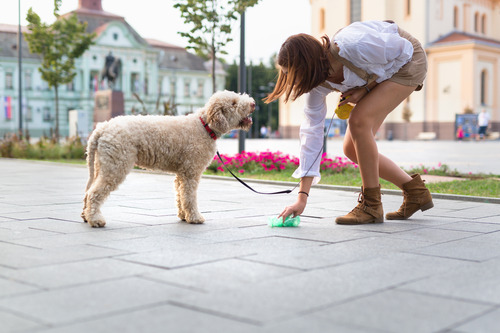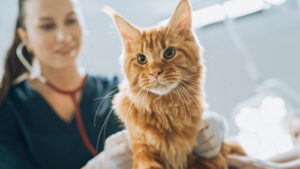When it comes to your dog’s health, monitoring their bowel movements can provide valuable insights. If you’ve noticed your dog’s poop encased in a membrane, you might wonder if this is normal. In this blog, we’ll explore what it means when your dog’s poop is encased in a membrane, potential causes, and when to contact your veterinarian. If you’re concerned about your dog’s health or for guidance tailored to your pet’s specific needs, call Loveland Regional Animal Hospital at (513) 697-9796.
What Does It Mean If Your Dog’s Poop Is Encased in Membrane?
Dog poop encased in a membrane can be concerning for pet owners. This phenomenon is usually linked to the presence of mucus, which can indicate various health issues. Mucus is a slimy substance produced by the mucous membranes lining the intestines. It acts as a lubricant to help stool pass through the intestines smoothly. While small amounts of mucus in dog poop can be normal, excessive mucus that encases the stool is not typical and may indicate an underlying issue.
Potential Causes of Mucus in Dog Poop
Several factors can cause mucus in dog poop and may indicate whether your dog requires professional veterinary attention.
Dietary Indiscretions
Dogs are known for their curiosity, often leading them to eat things they shouldn’t. Consuming foreign objects or inappropriate foods can irritate the intestines, resulting in mucus production. If your dog has recently eaten something unusual, this might explain the presence of mucus in their stool.
Intestinal Infections
Intestinal infections caused by bacteria, viruses, or parasites can lead to inflammation of the intestines, which may result in mucus-covered poop. Common symptoms of intestinal infections include diarrhea, vomiting, and lethargy.
Inflammatory Bowel Disease (IBD)
IBD is a chronic condition characterized by inflammation of the intestines. Dogs with IBD often exhibit symptoms such as diarrhea, weight loss, and mucus in their stool. If your dog frequently produces poop encased in membranes and displays other symptoms of IBD, a vet visit is warranted.
Allergies and Food Intolerances
Identifying and eliminating the allergen from your dog’s diet can alleviate symptoms. Common allergens include certain proteins, grains, and dairy products. To determine if a food allergy is causing the mucus in your dog’s poop, your veterinarian might suggest an elimination diet. This involves feeding your dog a novel protein and carbohydrate source that they haven’t eaten before and monitoring for changes in symptoms.
Stress and Anxiety
Situations such as moving, new household members, or changes in routine can be stressful for dogs, impacting their gastrointestinal health. To help manage your dog’s stress, maintain a consistent routine, provide plenty of exercises, and create a calm environment. In some cases, your veterinarian may recommend behavioral therapy or medication.
When to Bring Your Dog to the Vet
Although occasional mucus in dog poop can be normal, persistent or excessive mucus encasing the stool warrants a vet visit. Monitoring your dog’s overall health and noting any additional symptoms can help your veterinarian diagnose the issue more effectively.
Notable Symptoms to Watch For
- Persistent diarrhea or constipation
- Vomiting
- Lethargy
- Weight loss
- Changes in appetite
Diagnosing the Cause of Mucus in Dog Poop
Your veterinarian at Loveland Regional Animal Hospital will perform a thorough examination to determine the cause of mucus in your dog’s poop. This may include a physical exam, fecal tests, blood work, and possibly imaging studies.
Fecal Tests
Fecal tests help identify parasites or infections that could be causing the mucus. A stool sample is examined under a microscope to check for the presence of parasites, bacteria, or other abnormalities.
How We Treat Mucus in Dog Poop
Treatment for mucus in dog poop depends on the underlying cause. Your veterinarian will recommend appropriate treatment based on their findings.
Dietary Changes
If a food allergy or intolerance is identified, switching to a hypoallergenic or limited-ingredient diet may help. Gradually introducing the new diet can prevent gastrointestinal upset.
Medication
In cases of infection, your veterinarian may prescribe antibiotics, antiparasitics, or other medications to address the issue. Anti-inflammatory drugs may be prescribed for conditions like IBD.
Supporting Your Dog’s Digestive Health
Maintaining your dog’s digestive health can help prevent issues like mucus in their poop. A balanced diet, regular exercise, and routine veterinary care are key components.
- Probiotics and Digestive Enzymes: Probiotics and digestive enzymes can support your dog’s digestive system. These supplements help maintain a healthy balance of gut bacteria and improve digestion.
- Regular Vet Check-Ups: Routine veterinary visits help monitor your dog’s overall health and catch potential issues early. Your vet can provide personalized advice on maintaining your dog’s digestive health.
Keep an eye on your dog’s bowel movements and overall behavior. Regular monitoring can help you catch potential health issues early and seek prompt veterinary care. If you notice your dog’s poop is encased in a membrane, consult your veterinarian at Loveland Regional Animal Hospital by calling (513) 697-9796. Our team is here to help you ensure your dog’s well-being and address any concerns you may have.





